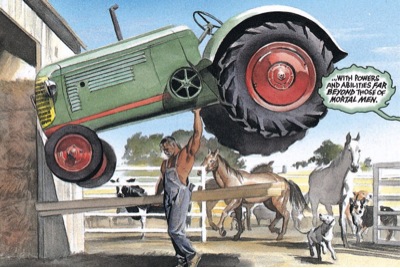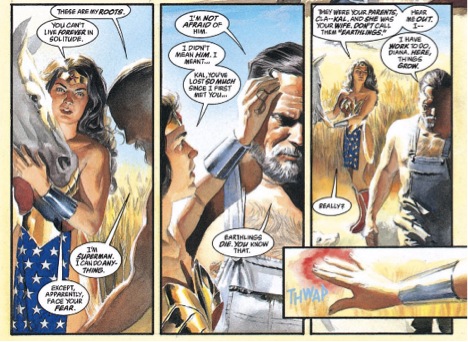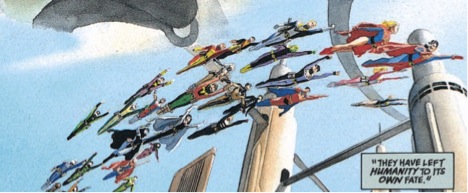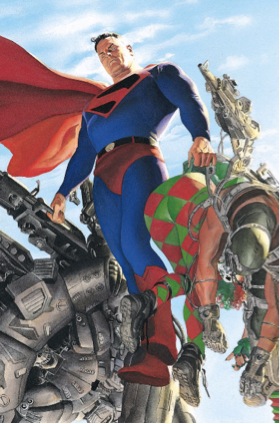Ever since Man of Steel, the comics community has been embroiled in a heated debate about Superman’s true nature. There are those that defend the idea of Superman killing a villain for the greater good, while others – the majority, I think – reject that out of hand. Personally, I prefer Superman without blood on his hands, because no matter what stories are told about the characters now, the Man of Tomorrow is more than just a character. Superman is an ideal to aspire to, a beacon of hope that refuses to compromise no matter the circumstances. A hero.
Now, those arguing in favor of Supes committing an act of extreme violence bring up the point that being forced to kill, for this peaceful hero, is the ultimate tragedy, a chance to tell a Superman story that has never been told, to examine the true nature of incredible power. And I get that – I do. I also know that this conversation has been going on for a long time, and I’m not setting out to weigh in on this old debate. In preparation for the release of Batman v Superman, Blastoff’s very own Scott Tipton recommended Kingdom Come – and if you guys know Scott, you know he doesn’t mess around when it comes to recommendations. Scott knows his capes and tights, so that very day, I got myself the first issue.
Upon reading it, I began to think about the idea of testing Superman, of making him face the ultimate tragedy toward forcing him to kill. What Kingdom Come shows is that there are more effective ways to examine the true desperation that can come when a legend like Superman’s hope is shaken to the core. Mark Waid, who wrote Kingdom Come with Alex Ross, has spoken more about the nature of Superman than probably any other living comic creator. He ‘gets’ Superman, so it was especially poignant to read his depiction of a depressed and isolated Superman that examined the flawed nature of heroism, of unyielding hope, and of symbols without attempting to deconstruct what makes Superman the definitive superhero.
The story begins in the distant future of the DC Universe, when a minister named Norman McCay visits an elderly Wesley Dodds, who seems to be suffering from delusions that he mistakes as a dark prophecy. When Dodds, once known as the Sandman, dies and passes his visions off to McCay, the preacher realizes that there is truth to Dodds’ strange ramblings. McCay is approached by the Spectre, who takes him on a journey to show him just how bad things have gotten. The last generation’s heroes – Wonder Woman, Green Lantern, Batman, and the Flash – have disbanded the Justice League after Superman went into isolation. Superman’s parents are dead and Lois Lane was murdered, forcing the one-time embodiment of hope to fall into a depression. Now, this new generation of superheroes seems to lack the moral compass of the original Justice League, which is leading to a pending superhero apocalypse. At the forefront of these costumed heroes is Magog, a ‘modern’ Man of Tomorrow who, unlike Superman, will kill and cause mass destruction in interest of the greater good.
As the Justice League once again assembles to face this new threat, I find myself thinking about that old argument regarding the integrity of Superman. Right now, the Superman in the DC movies seems, on the surface, to be closer to Magog than the original Man of Tomorrow, or even the disillusioned loner that Clark Kent has become in the first chapter of Kingdom Come. I wonder what that means for us, and what it means for the future of Superman. Kingdom Come also brings up a host of other interesting points – some that interest me, some that make me uneasy. Kingdom Come suggests that the older generation had it right, and that the newer generation is messing up. This seems to stand in harsh contrast to the progressive and modernist All-New, All Different Avengers (also by Mark Waid), which celebrates the younger heroes in modern times striking out and picking up the mantle of the old heroes. But then, thinking about Kingdom Come on another level, I’m wondering if Waid and Ross’s story isn’t about an older generation being glorified, but rather the idea of the older generation letting down the next one. The way that Waid has painted Superman here is a hero who held the nation’s hope on his shoulders – he was more than a man to them. He had become to the future heroes a symbol, just like he has to the longtime readers of his comics. When that symbol let them down, and Clark Kent the man was crushed by his own personal lost, the hope that was placed on his shoulders was shattered, leaving both generations of heroes disenfranchised.
Perhaps Kingdom Come is a warning against the idea of putting too much stock in symbols. Or, on the other hand, perhaps it’s a reminder that we need heroes, and that when we allow them to erode and fall into obscurity, we are somehow less – we are left in need of a hero. Both of these interpretations make me anxious for Batman v Superman, because you know what? I love Superman, and I believe in what he stands for. No matter what the character has been through, whatever will be changed about him in the comics, that legacy remains. Through all of the darkness, I hope to look toward the Man of Steel and feel hope for tomorrow.
PAT SHAND writes comics (Family Pets, Robyn Hood, Hellchild), novels (Charmed for HarperCollins), and pop culture journalism (Sad Girls Guide, Blastoff Comics). You can find him on Twitter @PatShand where he constantly tweets about comics and coffee.






Comments are closed.